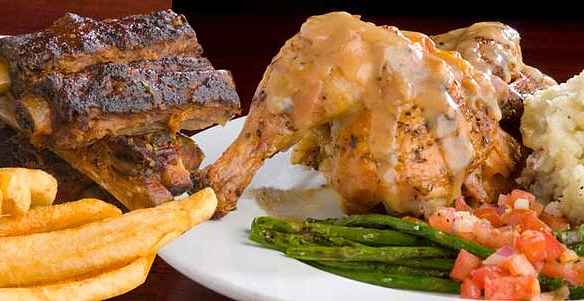





See listing of Recent and Most Popular articles on the Home Page
My World
Category: General / Topics: Cooking • Food & Nuitrition • History • Lifestyle, General • Memories
Food, Glorious Food!
by Stu Johnson
Posted: January 30, 2018
Memories and reflections on one of God's gifts to us…
No. 9 in the Thursday Morning Guy’s group series (see list)
Once again, I report from the Thursday Morning Guys group I’ve been attending at a local church. Each week one of the guys suggests a topic for discussion. The blogs that result are not minutes from the session, but an attempt to glean useful themes, to which I may add my own insights. The topic at the January 25 session focused on food.
THE DISCUSSION STARTER
Topic suggested by one of the guys, shared in an email the night before
Here's a very practical topic for Thursday: Food - glorious food!
If you could set the menu of your favorite foods for a day, what would it look like?
How have your eating habits and food choices changed over the years?
When you dine out, what do you order?
What does the Bible say about eating and food?
THE CONVERSATION
Like last week’s topic on winter fun and injecting humor in everyday life, this week was also mostly reminiscing and sharing. Several themes emerged:
Childhood Memories
- Sunday dinner was typically the big meal of the week, since for most people in those days (40s-60s for most) it was a day to go to church, then come home for a family dinner. Some type of beef roast was most commonly recalled. It was a busy day for Mom, though, getting kids ready for church, preparing for dinner—thank goodness for oven timers, which meant that wonderful aromas filled the house when you came home. One of the guys grew up in an apartment at the top of a six-flat, so he remembered how the smell of fresh bread and roasted meat grew stronger and more enticing as he climbed the stairs.
- A new age. The post World-War II years brought many new innovations, from appliances to food processing.
- It was the age of electricity, so along came a host of new devices: the electric skillet, popcorn makers, toaster ovens, among the most popular.
- Frozen vegetables were a great improvement over canned, though more things now came in cans in the form of prepared foods (Chef Boyardee ravioli with its orange “tomato sauce” is one I remember). One recalled hearing a sibling ask, “why can’t we have canned soup like other people?”
- To make room for the new frozen foods required freezers. Gone was the refrigerator with a freezer just big enough for a tray of ice cubes and a half-gallon of ice cream (remember when it was really a half-gallon?). My aunt and uncle were the first in our family to get a freezer, a chest model complete with a package deal on meats and vegetables to fill it.
- Grocery stores began to replace smaller specialty stores (“dry goods,” produce, butcher, bakery) and the “shopping cart” changed from the two-wheeled one used for trips to the corner store to the four-wheeled model you pushed through the aisles to gather your items. The first grocery store in my neighborhood in Chicago was an A&P, though I’m sure it was no bigger than a Walgreen’s today, and the carts had to be tiny to navigate the narrow aisles.
- Other memories
- The mother of one of the guys worked in a bakery that made great baked beans, so every Saturday night they would have baked beans and hot dogs.
- Several recalled trips to Swedish bakeries for limpa (a sweet rye bread) or cardamom coffee cake. Others recalled a local bakery that would run out of almond-braid coffee cake if you didn’t get there by 7 AM.
- Christmas traditions – my own family always did a Smorgasbord on Christmas eve, with many elements of the Swedish spread passed down by my immigrant grandparents and others in their church. Every family contributed their part, including plates overflowing with home-baked cookies. At that time, the Andersonville neighborhood on the north side of Chicago had several Swedish bakeries and delis; few are left today as Andersonville has become a cosmopolitan mix of multiple ethnic groups.
- I recalled a little diner near us (down the street from where a Dairy Queen and the first McDonald’s in our area would be built). My friends and I used to go there to get their version of a “French fry,” a big Idaho potato spiralized into one long curly fry.
- Away from home and overseas, one of the guys recalled having to consider swordfish steaks as his Thanksgiving dinner
- Fondly remembered were the “one-in-a-million” shake from Prince Castle (later Cock Robin), along with penny candy, Dairy Delight, Dairy Queen, Dog & Suds
- One recalled that when his family went to restaurants, his mother encouraged the children to try new things
- “Salad” was more likely a wedge of lettuce than today’s mixture of greens (which reflects in part the changes in agriculture and shipping)
- The mother of one of the guys would be give him two twenty dollar bills to go do the grocery shopping for his family for two weeks. Always included was a six-pack of root beer and ice cream. Making root beer floats was a real treat he has not forgotten—now it seems those special moments have become an expected part of the routine.
From Mom's cooking to married life or being on your own
- Expectations that your wife will do what Mom did often required “accommodation”--change what you eat or make it yourself! Over time, however, it begins to feel like you’ve always done it “our” way.
- Several learned to appreciate new foods and traditions by marrying into families from different backgrounds.
- One recalled that his parents spent only a few dollars a week for groceries when first married (with a saved receipt to prove it!). For most of this group, married in the late 50s or 60s, those early trips to the grocery store cost $15 to $30 or so per week.
Today
- Favorite meals (combination of home and dining out)
- Breakfast: pancakes; pancakes with lingonberries; French toast, fruit, coffee; biscuits and gravy; roast beef skillet; Eggs Benefict
- Lunch: pickled herring and crackers; burger; salad; soup
- Dinner: strip steak, baked potato; roast turkey, stuffing, potatoes; beef medallions; pork chop, red potatoes and asparagus; seafood (salmon); Chinese
- Sunday dinner will more likely be Boston Market take-out or a sit-down restaurant rather than home-cooked. In my own case, especially after our children were on their own, our habits have changed and Sunday has become a lighter day, more focused on getting out to do something than on preparing a big meal—especially in the warmer weather when there are concerts and festivals, and plenty of places in the Chicago area to walk or just sit and read in a pleasant setting.
- Current tastes – one man’s pleasure remains another’s poison – sometimes our tastes change, but some are set early. A few things that some cannot tolerate but others love including liver and onions, pickled herring, lamb, rabbit. In some cases, it is a matter of learning to cook something properly to make it more palatable, in others it may be a lost cause! Perhaps the old adage you may have heard your mom or grandma say, “try it, you’ll like it,” is worth remembering. With the growing cultural diversity in many communities today, why not try something unfamiliar? Maybe you can expand your horizons—or at least be able to say you tried it!
- Pizza came up several times in the conversation, including:
- First or favorite places and types of pizza.
- One had a friend who worked at a pizza place would bring pizzas called in but not picked up—ended up with some strange combinations!
- In our home, we started a tradition of home-made pizza on Saturday nights that our children have continued with their own families. Ours has evolved over time, from traditional cheese and sausage (using tomato sauce made from tomatoes from our garden) to our latest version with spinach, goat cheese and cherry tomatoes (unfortunately, after moving to a town house three years ago, we can no longer grow our own tomatoes).
What memories or observations can you add?
PRINCIPLES PROPOSED
While the hour went by with much laughter and storytelling, I caught several threads that could be identified as principles to embrace:
Combing our discussion (much of it storytelling) with Scripture references (below), there are a few principles we can derive on the matter of food:
Food is fundamental—not only do we need food to maintain life, but it is also an important social activity—from gathering food (growing it or buying it), preparing it, and eating. In addition, food provides a means for us to express the gift of creativity that God built into us (creating us “in his image”)—from the simple act of a child decorating a cupcake to the most incredible presentations by masters of the culinary arts.
Food is a way to serve others–we are called by our own humanity and by our Heavenly Father to use food to meet the needs of those who are hungry, whether in our own neighborhoods or on the other side of the world. Jesus reminded the Jewish leaders that all the detailed commandments God had given them could be boiled down to two (often called the Great Commandment)—loving God and loving our neighbors. We can do this through food pantries, soup kitchens, the preparation of meal ingredients (through organizations like Feed My Starving Children), or providing financial support to many organizations operating in areas of need.
Food is cultural—in an age of growing cultural diversity in many parts of the world, there is an opportunity the learn about different people through the food they eat. Did you ever hear your mom or grandma say, “try it, you’ll like it”? It’s worth taking the effort to introduce yourself to other cultures—and being a good neighbor (see the example in the next point).
Food is central to hospitality –whether serving strangers or friends, we often associate food as a means of providing hospitality. Depending on the circumstances, hospitality may also involve the provision of shelter, rest, cleansing (body and clothing), and other ways of meeting needs. . In another setting I heard someone talk about asking new neighbors to come to their home for dessert. The family had come from eastern Europe more than two years earlier. They indicated that this was the first time they had been in an American home. The simple gesture of conversing over food opened a door to friendship and understanding.
Food is symbolic—the Bible uses food frequently as a metaphor for our spiritual relation with God. Jesus often spoke in these terms, referring to himself as the “bread of life” and using food both to serve people’s physical needs and to illustrate how he can satisfy their spiritual hunger. The elements of the Jewish Passover meal, the Christian sacrament of Communion, and festivals and observances of other faith traditions use food as symbols or spiritual things or reminders of important events.
What principles can you add from what you have learned, observed, and applied to your life?
GUIDANCE FROM SCRIPTURE (God’s written Word, the Holy Bible)
The Bible has a lot to say about food and eating. Here is a small sample:
God's Provision: food as part of God's plan
- [Hope for the future:] I will praise you in the great assembly. I will fulfill my vows in the presence of those who worship you. The poor will eat and be satisfied. All who seek the Lord will praise him. Their hearts will rejoice with everlasting joy. The whole earth will acknowledge the Lord and return to him. All the families of the nations will bow down before him. (Psalm 22:25-27)
- He gives food to every living thing. His faithful love endures forever. (Psalm 136:25)
- And people should eat and drink and enjoy the fruits of their labor, for these are gifts from God. (Ecclesiastes 3:13)
God's Provision: our role
- Then God said, “Look! I have given you every seed-bearing plant throughout the earth and all the fruit trees for your food. And I have given every green plant as food for all the wild animals, the birds in the sky, and the small animals that scurry along the ground—everything that has life.” And that is what happened. (Genesis 1:29-30)
- [A new role following “the Fall”:]By the sweat of your brow will you have food to eat until you return to the ground from which you were made. For you were made from dust, and to dust you will return. (Genesis 3:19)
- [The Joseph principle: store up food for years of famine]: Have them gather all the food produced in the good years that are just ahead and bring it to Pharaoh’s storehouses. Store it away, and guard it so there will be food in the cities. (Genesis 41:35)
- When you have eaten your fill, be sure to praise the Lord your God for the good land he has given you. (Deuteronomy 8:10)
- You send rain on the mountains from your heavenly home, and you fill the earth with the fruit of your labor. You cause grass to grow for the livestock and plants for people to use. You allow them to produce food from the earth—wine to make them glad, olive oil to soothe their skin, and bread to give them strength. (Psalm 13-15)
- A hard worker has plenty of food, but a person who chases fantasies has no sense. (Proverbs 12:11)
- Give us today the food we need, . . . (Matthew 6:11 – part of “The Lord’s Prayer)
Rules about food
- But you must never eat any meat that still has the lifeblood in it. (Genesis 9:4 – a prelude to a long list of specific rules about food in other parts of the Law—the first five books of the Bible—many of these had a basis in hygiene at that time)
God's Provision in times of need
- [God’s promise of “manna” during the Exodus]: Then the Lord said to Moses, “Look, I’m going to rain down food from heaven for you. Each day the people can go out and pick up as much food as they need for that day. I will test them in this to see whether or not they will follow my instructions. On the sixth day they will gather food, and when they prepare it, there will be twice as much as usual.” (Exodus 16:4-5)
- [Instruction to the prophet Elijah:] “Go to the east and hide by Kerith Brook, near where it enters the Jordan River. Drink from the brook and eat what the ravens bring you, for I have commanded them to bring you food.” (1 Kings 17:3-4)
- [Jesus feeds a hungry crowd from seven loaves and fishes:] Then he took the seven loaves and the fish, thanked God for them, and broke them into pieces. He gave them to the disciples, who distributed the food to the crowd. They all ate as much as they wanted. Afterward, the disciples picked up seven large baskets of leftover food. (Matthew 15:36-37)
Response to God's Provision: helping those in need
- “For the Lord your God is the God of gods and Lord of lords. He is the great God, the mighty and awesome God, who shows no partiality and cannot be bribed. He ensures that orphans and widows receive justice. He shows love to the foreigners living among you and gives them food and clothing. So you, too, must show love to foreigners, for you yourselves were once foreigners in the land of Egypt. (Deuteronomy 10:17-19)
- If your enemies are hungry, give them food to eat. If they are thirsty, give them water to drink. (Proverbs 25:21)
- John replied, “If you have two shirts, give one to the poor. If you have food, share it with those who are hungry.” ((Luke 3:11)
- What good is it, dear brothers and sisters, if you say you have faith but don’t show it by your actions? Can that kind of faith save anyone? Suppose you see a brother or sister who has no food or clothing, and you say, “Good-bye and have a good day; stay warm and eat well”—but then you don’t give that person any food or clothing. What good does that do? (James 2:14-16)
Food as a vital part of Hospitality
- [When visited by three men, Abraham offers hospitality: shade, water to wash their feet, and food): “And since you’ve honored your servant with this visit, let me prepare some food to refresh you before you continue on your journey.” . . . When the food was ready, Abraham took some yogurt and milk and the roasted meat, and he served it to the men. (for the full context see Genesis 18:1-8)
Food as part of the Good Life
- [Among the splendors of King Solomon’s court was the food on his tables:] When the queen of Sheba realized how very wise Solomon was, and when she saw the palace he had built, she was overwhelmed. She was also amazed at the food on his tables, the organization of his officials and their splendid clothing, the cup-bearers, and the burnt offerings Solomon made at the Temple of the Lord. (1 Kings 10:4-5)
- So I decided there is nothing better than to enjoy food and drink and to find satisfaction in work. Then I realized that these pleasures are from the hand of God. For who can eat or enjoy anything apart from him? (Ecclesiastes 2:24-25)
Food and Relationships, good and bad
- Better a dry crust eaten in peace than a house filled with feasting—and conflict. (Proverbs 17:1)
- But when you had eaten and were satisfied, you became proud and forgot me. (Hosea 13:6)
- So the people went away to eat and drink at a festive meal, to share gifts of food, and to celebrate with great joy because they had heard God’s words and understood them. (Nehemiah 8:12)
- Don’t tear apart the work of God over what you eat. Remember, all foods are acceptable, but it is wrong to eat something if it makes another person stumble. (Romans 14:20)
Food as spiritual Metaphor, Symbol
- Therefore, they must eat the bitter fruit of living their own way, choking on their own schemes. (Proverbs 1:31)
- They eat the food of wickedness and drink the wine of violence! (Proverbs 4:17)
- [Food is important, but…as Jesus said:] “That is why I tell you not to worry about everyday life—whether you have enough food and drink, or enough clothes to wear. Isn’t life more than food, and your body more than clothing? 26 Look at the birds. They don’t plant or harvest or store food in barns, for your heavenly Father feeds them. And aren’t you far more valuable to him than they are?” (Matthew 6:25-26)
- As they were eating, Jesus took some bread and blessed it. Then he broke it in pieces and gave it to the disciples, saying, “Take it, for this is my body.” (Mark 14:22)
- But Jesus replied, “I have a kind of food you know nothing about.” (John 4:32)
- “But don’t be so concerned about perishable things like food. Spend your energy seeking the eternal life that the Son of Man can give you. For God the Father has given me the seal of his approval.” (John 6:27)
- Jesus replied, “I am the bread of life. Whoever comes to me will never be hungry again. Whoever believes in me will never be thirsty. (John 6:35)
- I had to feed you with milk, not with solid food, because you weren’t ready for anything stronger. And you still aren’t ready, for you are still controlled by your sinful nature. . . . (1 Corinthians 3:2-3)
- And though we are many, we all eat from one loaf of bread, showing that we are one body. (1 Corinthians 10:17)
- For every time you eat this bread and drink this cup, you are announcing the Lord’s death until he comes again. . . . (1 Corinthians 11:26-34)
About the Scripture references: unless indicated otherwise, these are taken from the New Living Translation (NLT). Links connect to BibleGateway.com, where you can see other translations, view the broader context, listen to an audio version and find other Bible resources. Also check the resources available in the Enrich/Faith section of this site.
Search all articles by Stu Johnson
Stu Johnson is principal of Stuart Johnson & Associates, a communications consultancy in Wheaton, Illinois. He is publisher and editor of SeniorLifestyle, writes the InfoMatters blog on his own website and contributes articles for SeniorLifestyle. • Author bio (website*) • E-mail the author (moc.setaicossajs@uts*) • Author's website (personal or primary**)* For web-based email, you may need to copy and paste the address yourself.
** opens in a new tab or window. Close it to return here.
Posted: January 30, 2018 Accessed 512 times
![]() Go to the list of most recent My World Articles
Go to the list of most recent My World Articles
![]() Search My World (You can expand the search to the entire site)
Search My World (You can expand the search to the entire site)
![]() Go to the list of Most Recent and Most Popular Articles across the site (Home Page)
Go to the list of Most Recent and Most Popular Articles across the site (Home Page)
 Loading requested view...
Loading requested view...